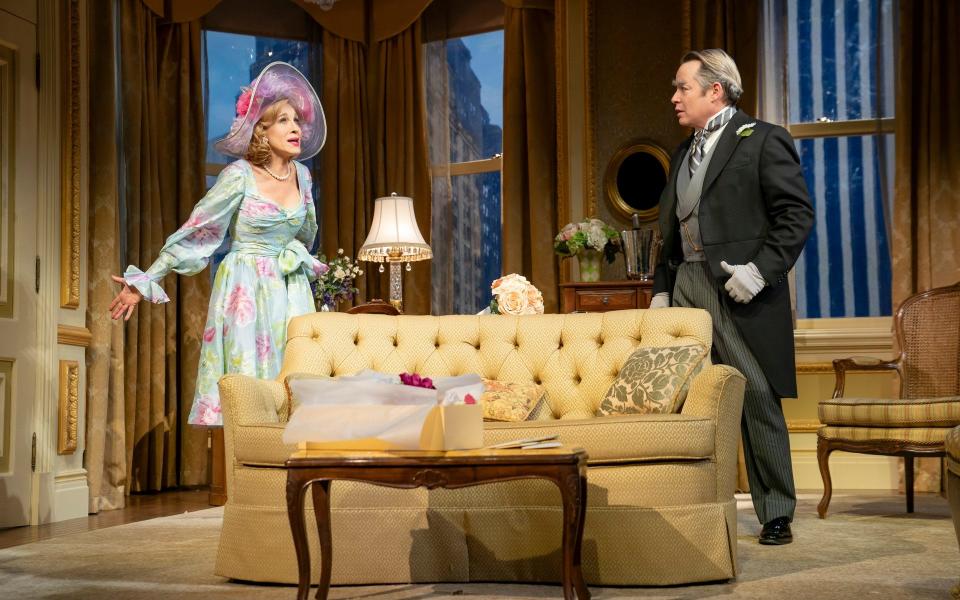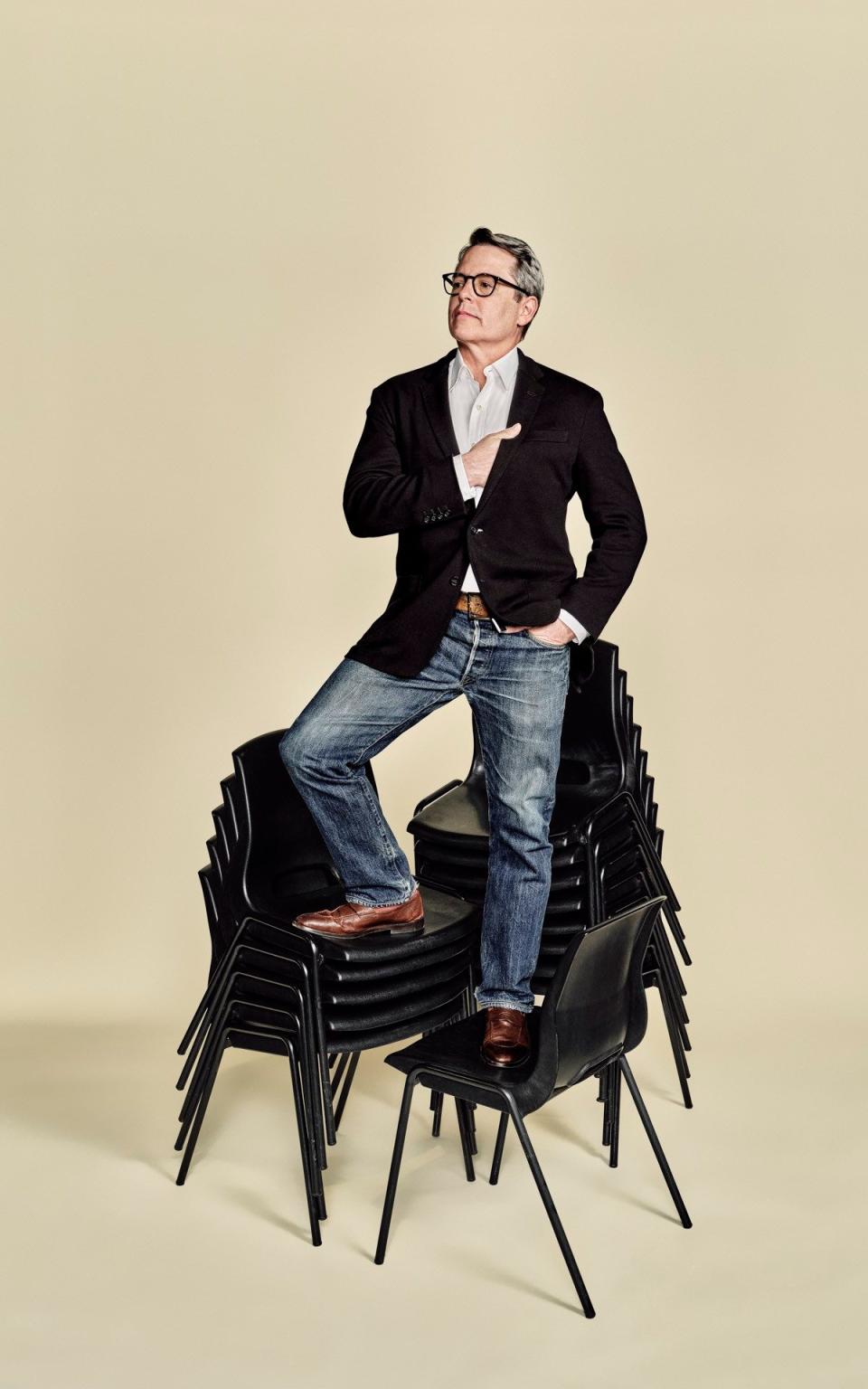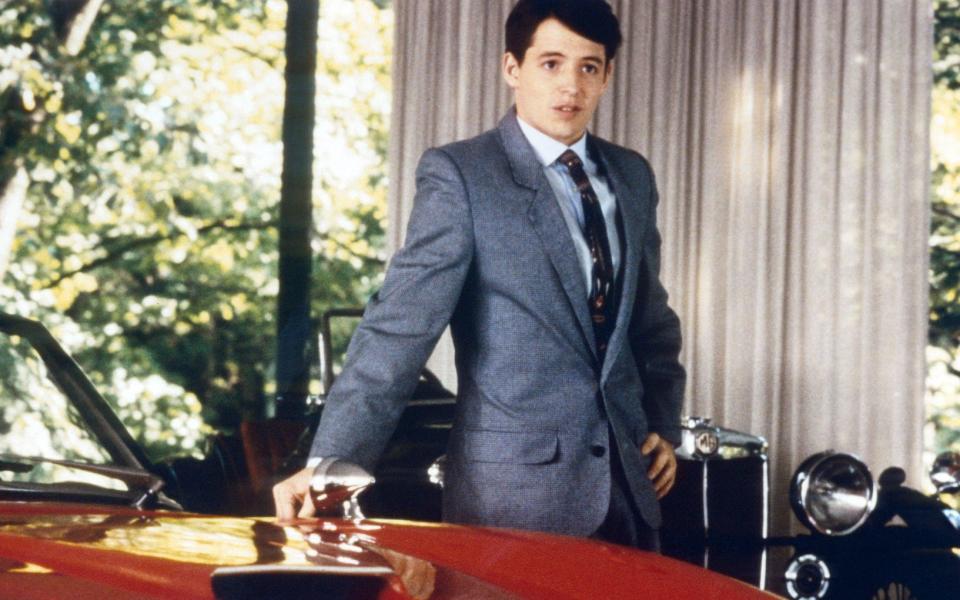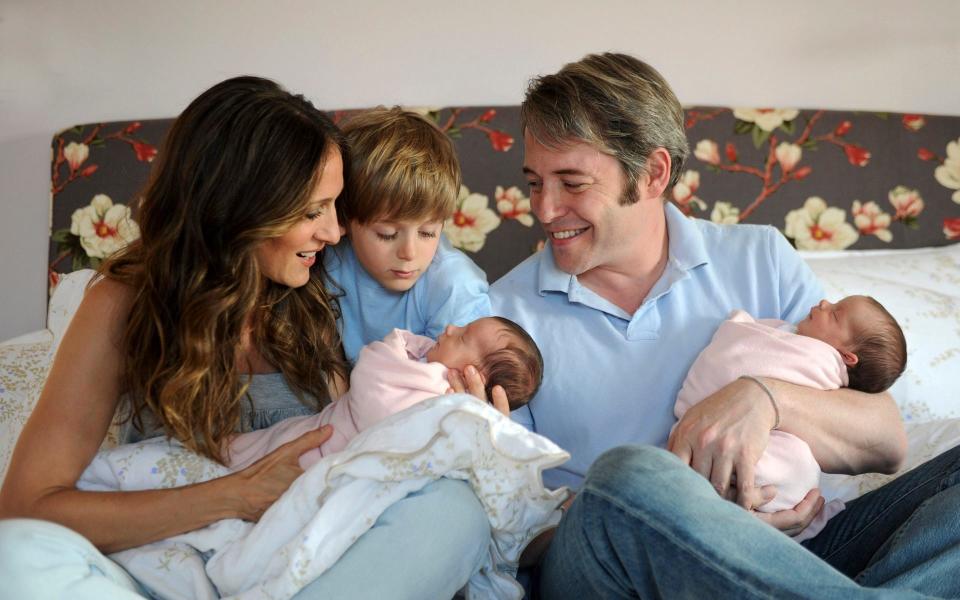Matthew Broderick: ‘I don’t feel competitive with my wife – I’m very happy for her’

‘I think you stink,’ yells Sarah Jessica Parker at her husband Matthew Broderick. ‘You’re a vain, self-pitying, deceiving 10-pound box of rancid no-cal cottage cheese.’
‘Swell,’ responds Broderick glibly, taking the abuse in his stride.
Fortunately this is not a scene from real life, in which the couple have been married for nearly 26 years – but from Plaza Suite, the Neil Simon production which opens in London on 17 January. A trio of one-act plays, which premiered in 1968, Broderick and Parker play three different couples at varying moments of crisis in their relationships.
Floating over the play is a fourth relationship: the one between Broderick and Parker. The couple are the equivalent of New York acting royalty, each hugely famous in their own right – he as a Tony Award-winning stage actor and star of films such as Ferris Bueller’s Day Off and The Producers (also a musical); and she, most notably, as Carrie Bradshaw in Sex and the City.
One of the most well-known showbiz couples of our time, together they are even more than the sum of their parts. But there was always an element of risk to partnering onstage: could it be that their personal success as a couple is partly dependent on the separation of their professional lives? Apart from a brief overlap in 1996, when Parker took over a role in the musical How To Succeed in Business Without Really Trying, in which Broderick was starring, the couple have never worked together. They have always scheduled their roles around each other, ensuring that if one of them has to be away, the other is at home with their three children – twins Tabitha and Marion, now 14, and 21-year-old James (now at college).
‘It seemed like it would be a lot of time together and [we wondered] what will that be like?’ says Broderick when I meet him at La Jolla Playhouse in California, where he is starring in another play, Babbitt. ‘I go to a deli in New York and see a husband and wife who work behind a counter all day long and they must go home and I think, “How do they not go crazy?” But now we’re just like them.’
At first they thought Plaza Suite would just last a few months, opening – as it did – in February 2020 in Boston and then transferring to Broadway. But Covid intervened and the Broadway show finally opened in February 2022, running for more than four months. And now the show is on its way to London, where the couple – who are part of the very fabric of New York City – will be living in a rented flat in Hampstead for three months.

‘We don’t know a lot of people in London,’ says Parker when I speak to her a few days later on the phone. ‘And we’ll be away from our daughters, which is somewhat fraught… We’re both very excited and obviously nervous – well, I am, I shouldn’t speak for others. But I’m always nervous before any project I care about.’
Broderick comes across as more laid-back. We meet in a small library at the back of the theatre. He is wearing a white shirt, jeans and loafers and looks like a cross between an amiable bank manager and an overgrown schoolboy. Relaxed and courteous, he unspools slowly, never giving the impression that he has anything more important to do.
Indeed, he drives directors mad with his apparent insouciance. ‘The other actors would already have very finished-looking performances and I’d still be holding the script and quiet. [The director] is in near hysterics occasionally. “I can’t see what we have, because you’re not doing anything.”’
Yet the moment the curtain goes up, Broderick nails it. ‘He drove me batty [in rehearsal],’ says Plaza Suite director John Benjamin Hickey. ‘But he really does have an X factor… Matthew’s slower way of working should never be confused with not working hard. He’s very self-deprecating and you underestimate him at your peril.’
‘It’s not a conscious thing,’ says Broderick. ‘It’s just who I am.’ He even remembers John Hughes, who directed him in Ferris Bueller’s Day Off, once shouting at him: ‘What is wrong with you?’ ‘I don’t know how to explain it,’ says Broderick. ‘I don’t really want to show people how much I know about the part in rehearsal. Once the audience comes, I don’t do that.’

The night before meeting him, I watched him onstage in Babbitt, an adaptation of Sinclair Lewis’s satirical 1922 novel. Broderick plays the morally bankrupt businessman with disarming humour, lifting what could otherwise be a slightly stodgy play. Plaza Suite, which veers between tragi-comedy and farce, is more in his wheelhouse, especially teamed with his wife, herself an excellent comedy actor. ‘She’s a wonderful partner,’ says Broderick. Which I guess you knew from the start? ‘I didn’t,’ he replies frankly. ‘This is different: acting. But her way of working is very compatible for me. I find her very easy to [work with] and I’m very impressed by her. I think she’s tremendously good…’
Meanwhile Broderick, says Parker, is ‘the most steady onstage companion’. ‘It’s been really wonderful. He’s one of the great interpreters of Neil Simon and not just understands the culture around the play, but the musicality of it, the timing: he is a hugely reliable partner.’
In the opening act, they play Sam and Karen Nash, who have been married for 22 or 23 years (they cannot quite remember). Karen has booked suite 719 – where all three acts take place – as they spent their wedding night here, too. But their marriage is unravelling before our eyes as it becomes apparent that Sam’s attention is elsewhere. In act two, they play Jesse and Muriel, high-school sweethearts rekindling an old relationship after (or during, in Muriel’s case) miserable marriages; and in the final act they take on Roy and Norma Hubley, desperately trying to persuade their reluctant daughter down the aisle. The reason she has locked herself in the bathroom, it emerges, is that she fears marriage will turn her and her fiancé into her bickering parents.
Does the play make them reflect on their own marriage? ‘Boy, you would think it would,’ says Broderick, ‘but I don’t know that it has… It’s more about depending on each other onstage that’s educational. How to help the other person and not take things personally. How to work together well is probably a good exercise for a couple.’
Broderick comes from acting stock – his father, James Broderick, became well known in the TV series Family. ‘We had our share of horrible stuff [his parents briefly split up] but I’m very happy with my childhood – particularly being a parent now and knowing how impossible it is.’
As a child he wanted to be an actor and enjoyed being backstage with his father, ‘especially the hot chocolate’. But when he was offered a stage role with his father, aged eight, he was horrified. ‘I burst into tears.’ It took a few more years before he felt confident enough and despite the apparent ease with which he established his career, he says he had his share of knock backs. ‘One day I read for a play and was halfway through my little monologue and they stopped me, like: “Thanks. Get out.” I cried.’ He checks himself: ‘I keep telling stories where I cry!’ Does he cry easily? ‘I think maybe I did when I was younger.’
His father gave him some good advice about how to withstand rejection. ‘If I didn’t get a part I would say, “I didn’t do it right” and he once said: “Why do you think you didn’t do it right? They pick the wrong person all the time so it may not be you. You didn’t lose the part. They may have lost you.” That sticks with me. It can apply to a lot of things.’
He says he didn’t really try at school and played the clown. ‘I had a stage where I would run down the street and jump into a pile of trash, which I thought was hilarious. I would get a lot of laughs that way. It doesn’t sound so funny now.’
By the time his career was taking off his father was very ill with cancer. Yet he delighted in his son’s progress and was thrilled when he got the lead in Brighton Beach Memoirs, also by Neil Simon. ‘My father called the soundstage where we were shooting [the 1983 film War Games, in which Broderick also starred] to ask how the table read had gone.’ That was the last time Broderick ever spoke to him. He died later that same night.
Broderick almost turned down the role of Ferris Bueller: ‘It sounds really stupid now… but it was yet another character that talked to the camera. I thought, “Am I getting stuck in a Bob Hope [persona]?” I was on the phone with my agent and it felt like by the time I hung up, he had flown to New York and was saying, “Let’s have dinner tonight, bring your mom,” because he wanted to make my mom make me [do it].’

How does he think his career would have been affected?
‘It’s possible it would have flourished in a different way. I hope that doesn’t sound arrogant. But I was doing rather well.’
For a while, he even regretted having done the film.
‘I used to sometimes think, “Boy, it doesn’t matter what I do. Everybody just thinks I’m Ferris Bueller.” But I now respect the movie much more… I’m actually pretty honoured to be in what’s I guess a classic.’
Even now, though, when Broderick is stopped in the street, he knows what question he is most likely to be asked. ‘Is this your day off?’ He rolls his eyes as he repeats it. ‘It surprises me that anyone would think I hadn’t heard that before.’ Otherwise, he says, questions usually focus on his wife. ‘Often they say, “Please tell your wife how much I like her.” And I say: “It’s the first thing I’ll say when I get home!” Once someone even asked: “Are you Sarah Jessica Parker?”’
He says he doesn’t mind that she is the more recognised of the pair. ‘I don’t feel competitive. I’m very happy for her.’
The two met in 1991 when Broderick was doing a play with Parker’s older brothers, Pippin and Toby. ‘The first time I met her I was very struck by her,’ says Broderick. ‘She was very special, somebody you wanted to look at. I think she was wearing a bright orange puffy coat. And white long johns in a sort of waffle material. And Timberland boots. She was very stylish.’
At the time, says Broderick, ‘Neither of us was really available. It took a while.’ Eventually he plucked up the courage to leave her a message on her answering machine. ‘Hi, it’s Matthew Broderick…’ They agreed to go on a date. ‘We went to a movie but couldn’t get in. So we went to a different movie: The Fisher King.’
They’ve been together more or less ever since. In 1997 they married secretly – even their invited friends thought they were attending a party, not a wedding. Parker memorably wore a black Morgane Le Fay wedding dress. They have lived in Manhattan ever since, holidaying in the Hamptons and in Kilcar, a village in County Donegal, where they have a house and where Broderick spent his summers as a child.

Ireland also holds painful memories for Broderick. In 1987, while driving near Enniskillen with actress Jennifer Grey, Broderick crossed into the wrong lane and crashed head on with another car. The driver, Anna Gallagher, 28, and her mother, Margaret Doherty, 63, were both killed instantly. He suffered a fractured leg and ribs and a collapsed lung, while Grey suffered severe whiplash, later needing surgery to avoid paralysis. Originally he was charged with causing death by dangerous driving and faced up to five years in prison, but he was eventually convicted of the far lesser charge of careless driving and fined £100 – which the victims’ family called a ‘travesty of justice’.
Broderick once said he would think about the accident every day for the rest of his life. ‘I do think about it,’ he says today, nodding sadly. ‘I’m not very comfortable talking publicly about it… It’s too serious to me.’
Did it change him? ‘I’m sure it did, absolutely, and obviously the people who didn’t live, it changed them. I don’t really have a philosophical take on it…’
He has done years of therapy. ‘I’ve had a lot of benefit from therapy.’ He adds dryly: ‘But there are times the therapist dies and then you have a little break and then you find another one.’ Does his therapist regularly die? ‘They gradually die.’
We move on to steadier ground. Broderick says that he and his wife have very different pre-show routines and even arrive at the theatre separately, a practice they will try to continue in London. ‘My wife likes to get there earlier than I do. And it’s probably not a bad idea to have some space.’
‘He has a system that works very well for him,’ says Parker. ‘I always get there very early. I listen to podcasts while I put my make-up on and get my wig on. It’s quiet. I really like it.’
In the meantime Broderick, she says, will be playing Bananagrams with his cast mates and having a sandwich.
Of the three men he plays in Plaza Suite, Broderick says he likes Jesse the best. ‘Even though he’s such a sleazeball, I definitely can relate to him.’ In what way? ‘He’s slightly bulls—ty. Needy. He makes me laugh… But most people would say I’m most like the first one, Sam.’ Really, I say, surprised. Sam who is having an affair with his secretary and treats his wife like a child?
‘OK, I take that back,’ says Broderick. ‘He’s really unpleasant.’

As for the third character, he says he can easily imagine the frustration of a father trying to coax a reluctant bride-to-be daughter out of the bathroom. ‘I think any parent can relate to that. We have one very stubborn daughter, she is incredibly determined, even when she was little. Which is a very good quality, I feel, but… [at the time] you’re just pulling your hair out. Once I was trying to get her to take her medicine or something and she wouldn’t. So I told her I was going to call the police. She was about six. She said: “Go ahead.”’
As a parent, he says he is not very strict. Who is the stricter? “My wife is, I think... I probably ought to be stricter. But every now and then I have [my moment].’
Every year, usually just before Broderick and Parker’s wedding anniversary, a story will creep into the media about supposed problems between them. When Broderick last appeared in a play in London in 2019 – Starry Messenger – there was a report of a ‘screaming match’ between the two outside a restaurant about the amount of time he was spending away from home. Parker was so enraged that she took to Instagram to refute it.
‘It’s not totally amusing,’ says Broderick now. Is there ever a grain of truth? ‘Sometimes a grain of truth and sometimes not at all. But also a grain is worse than…’ He tails off: ‘A grain is not very helpful.’
So to take on a play focusing so directly on marriage is a daring move. ‘It’s like leaning into the wind,’ jokes Broderick.
Do they forget onstage that they are married to each other in real life? ‘That’s so meta,’ says Parker. ‘I can’t be sure… Our marriage is very separate from all of these characters. And I think that’s what makes it fun for us. We weren’t interested in exploring our marriage before an audience like a course in therapy. If that had been the case, we would not have wanted to do it… I understand that people will project on to it. And I don’t blame them, it’s very confusing.’
Broderick agrees. He does not see Parker as his wife when he is acting on stage with her. ‘I think it’s time off from our relationship in real life.’ Nor do they post mortem the shows afterwards. ‘We certainly don’t talk about the play. Or anything much. We usually [get in the car] and text other people. And then we go to eat somewhere.’
A message pings on his phone. It’s from his old friend Kenneth Lonergan, the director, who has arrived to stay with him in La Jolla. Broderick chuckles as he reads it aloud: ‘What time does his Lordship expect to be home?’
It’s time to wind up. As we walk towards his car, I ask Broderick if there is a secret to the longevity of his partnership with Parker. ‘I’m curious myself,’ he says, answering in his usual laconic style. ‘I guess we’re well suited. Time passes. And here we are.’
Plaza Suite is at the Savoy Theatre, London, from 17 January to 31 March; thesavoytheatre.com
